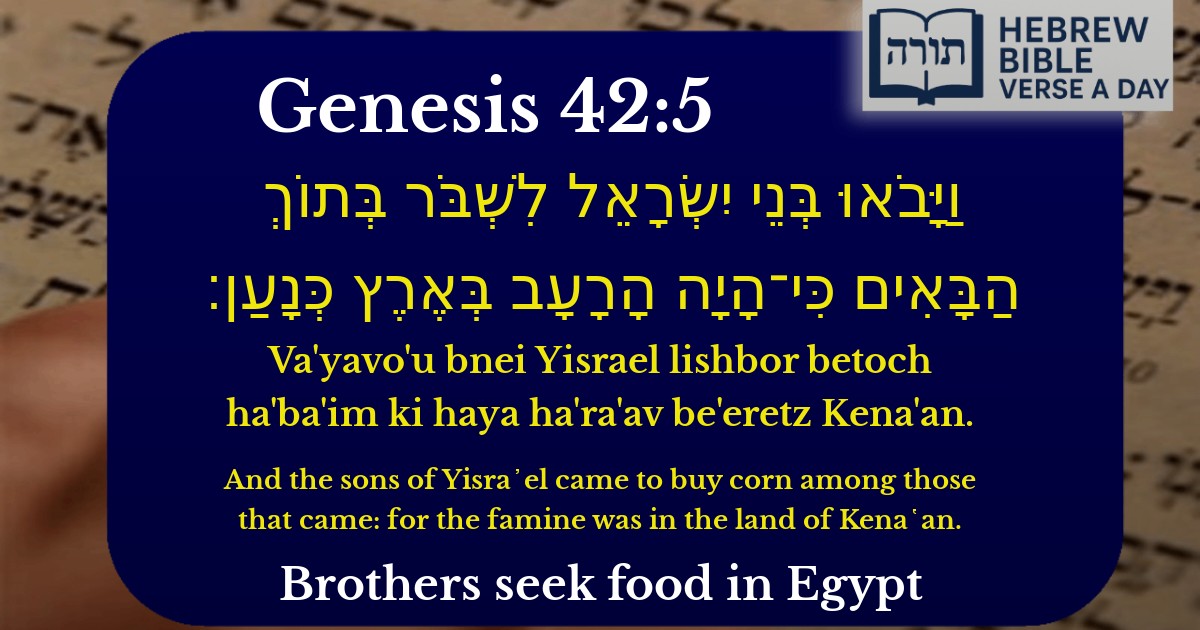Join Our Newsletter To Be Informed When New Videos Are Posted
Join the thousands of fellow Studends who rely on our videos to learn how to read the bible in Hebrew for free!
Hebrew Text
וַיָּבֹאוּ בְּנֵי יִשְׂרָאֵל לִשְׁבֹּר בְּתוֹךְ הַבָּאִים כִּי־הָיָה הָרָעָב בְּאֶרֶץ כְּנָעַן׃
English Translation
And the sons of Yisra᾽el came to buy corn among those that came: for the famine was in the land of Kena῾an.
Transliteration
Va'yavo'u bnei Yisrael lishbor betoch ha'ba'im ki haya ha'ra'av be'eretz Kena'an.
Hebrew Leining Text
וַיָּבֹ֙אוּ֙ בְּנֵ֣י יִשְׂרָאֵ֔ל לִשְׁבֹּ֖ר בְּת֣וֹךְ הַבָּאִ֑ים כִּֽי־הָיָ֥ה הָרָעָ֖ב בְּאֶ֥רֶץ כְּנָֽעַן׃
וַיָּבֹ֙אוּ֙ בְּנֵ֣י יִשְׂרָאֵ֔ל לִשְׁבֹּ֖ר בְּת֣וֹךְ הַבָּאִ֑ים כִּֽי־הָיָ֥ה הָרָעָ֖ב בְּאֶ֥רֶץ כְּנָֽעַן׃
🎵 Listen to leining
Parasha Commentary
📚 Talmud Citations
This verse is not quoted in the Talmud.


Context in the Narrative
The verse (Bereshit 42:5) describes the sons of Yaakov traveling to Mitzrayim to purchase grain during a severe famine in Eretz Kena'an. This event marks the beginning of the dramatic reunion between Yosef and his brothers, setting the stage for the eventual descent of Bnei Yisrael to Mitzrayim.
Rashi's Commentary
Rashi explains that the phrase "בְּתוֹךְ הַבָּאִים" ("among those that came") implies that Bnei Yisrael did not arrive as a unified group but rather blended in with other travelers to avoid drawing attention. This was due to their fear of being recognized as the brothers who had sold Yosef into slavery, as they were now entering his domain (Rashi on Bereshit 42:5).
Ibn Ezra's Insight
Ibn Ezra notes that the famine was particularly severe in Eretz Kena'an, which forced Yaakov's family to seek provisions in Mitzrayim. He emphasizes that this was part of Hashem's divine plan to fulfill the prophecy given to Avraham at the Brit Bein HaBetarim (Bereshit 15:13), where it was foretold that his descendants would dwell in a foreign land (Ibn Ezra on Bereshit 42:5).
Midrashic Interpretation
The Midrash (Bereshit Rabbah 91:6) highlights the brothers' humility and unity in this moment. Despite their previous conflicts, they now acted collectively to sustain their family. Additionally, the Midrash teaches that the famine was a yissurim shel ahavah (afflictions of love) to bring about teshuvah and reconciliation.
Rambam's Perspective
Rambam (Moreh Nevuchim 3:36) discusses the natural and providential aspects of famine, explaining that while famines are natural occurrences, they also serve as divine mechanisms to guide historical events—in this case, leading Bnei Yisrael to Mitzrayim to fulfill the covenant.
Halachic Implications